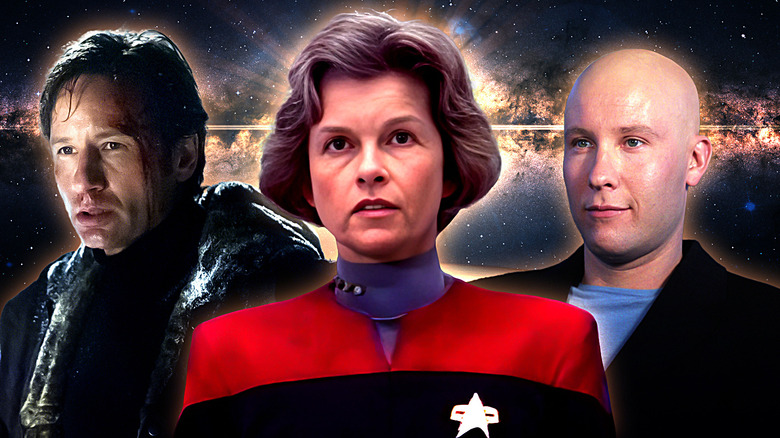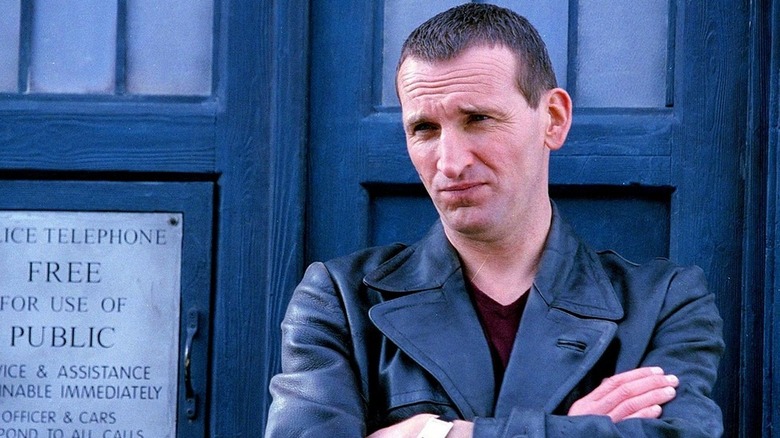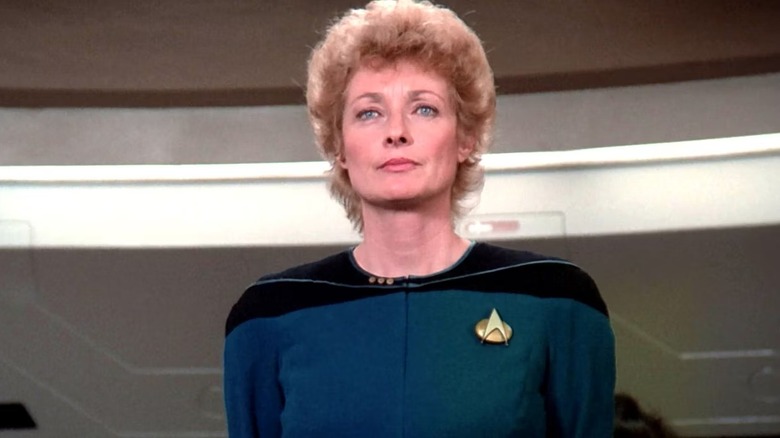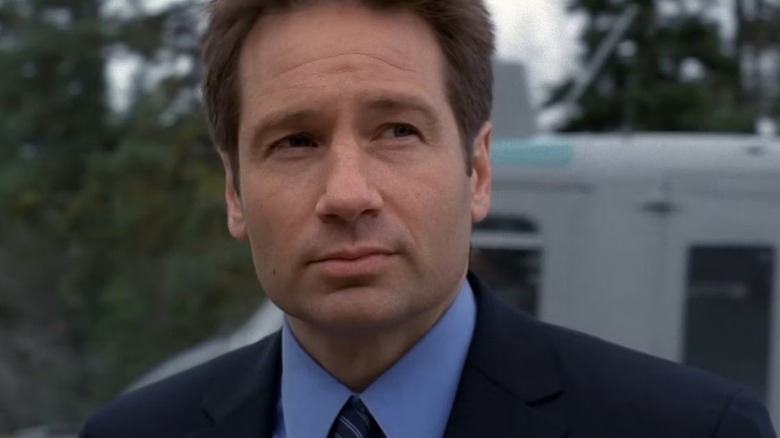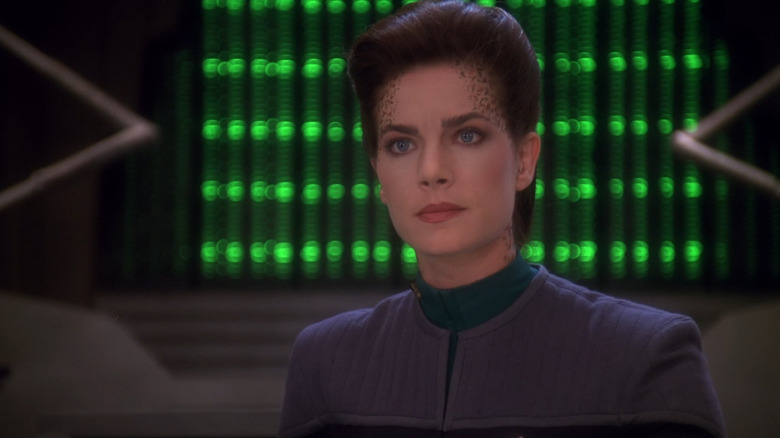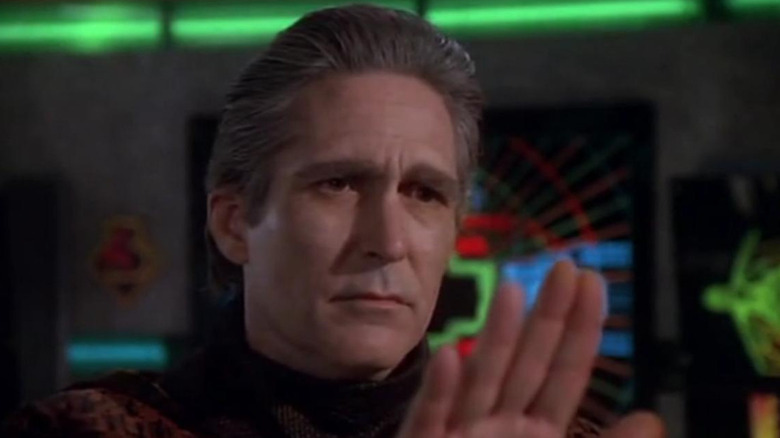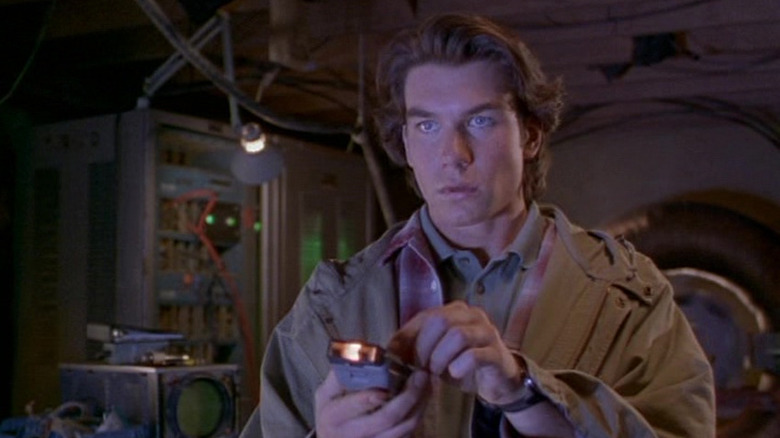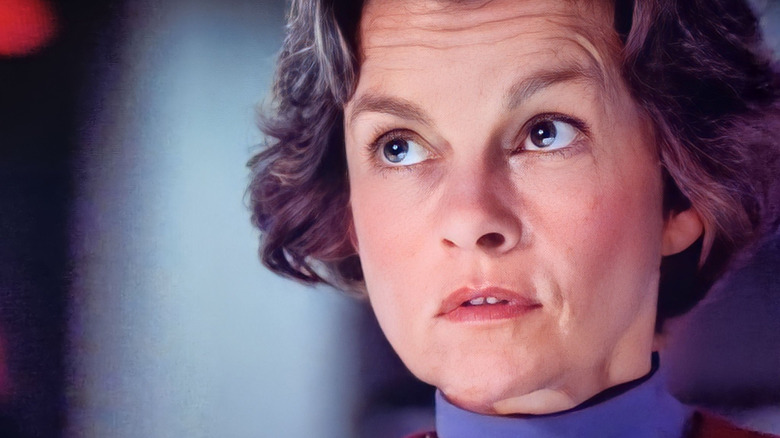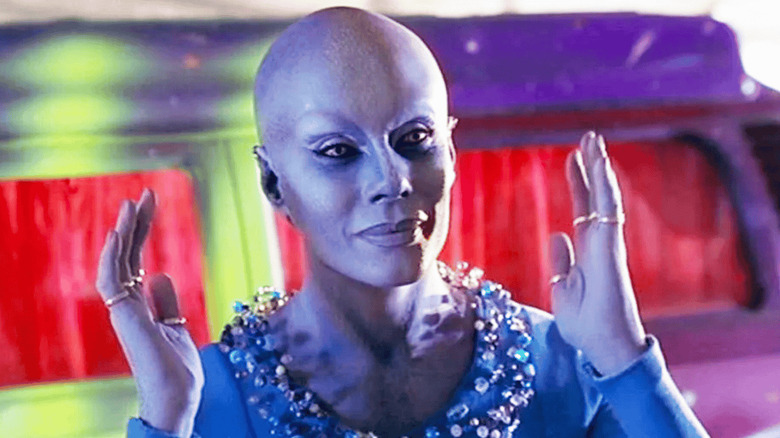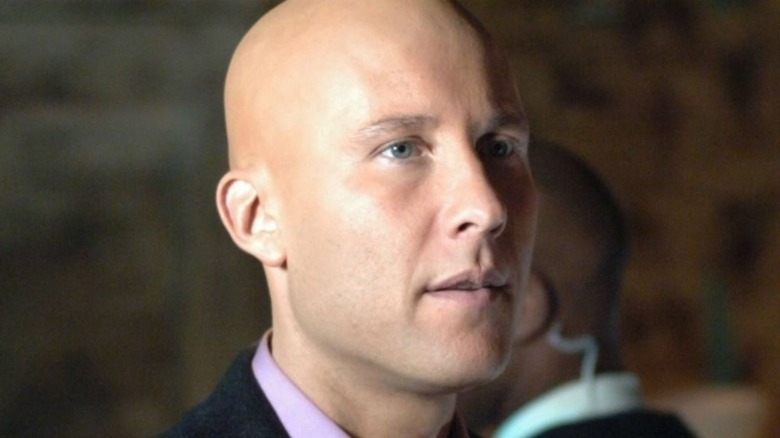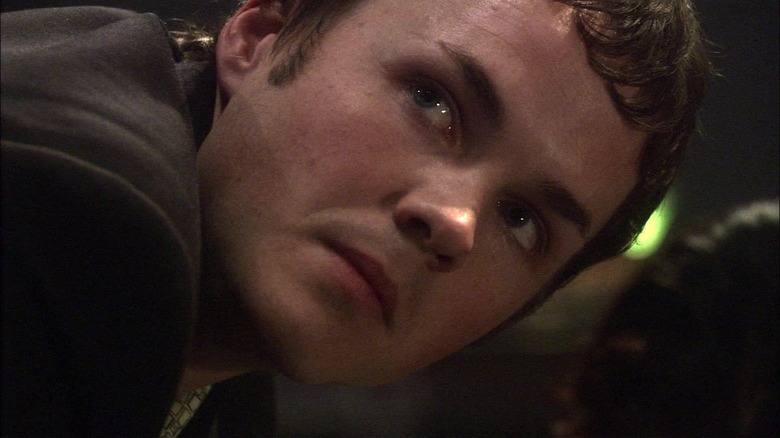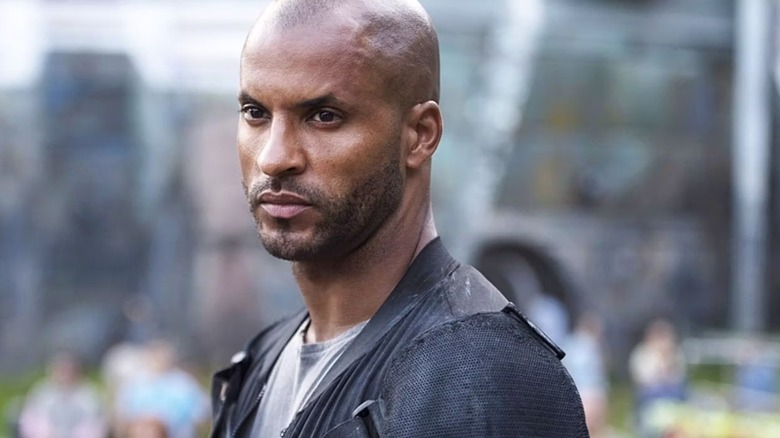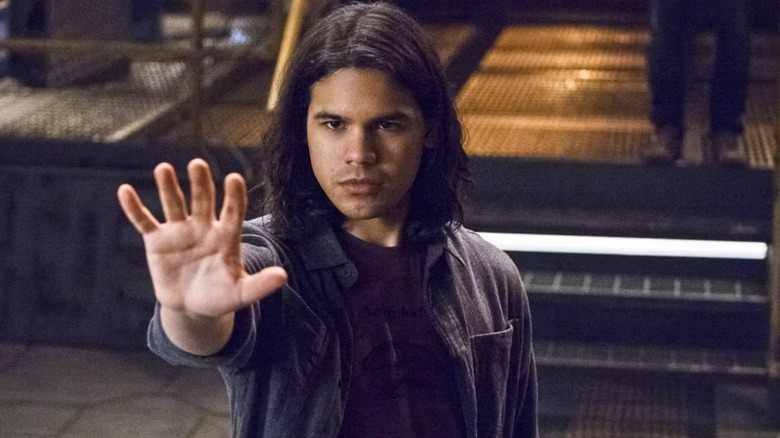Why These Actors Quit Beloved Sci-Fi Shows
Even the most popular and successful science fiction television series see changes to their main cast over the years. From the grueling schedule of long filming hours to trying to seek new opportunities in one's career, there are numerous reasons actors leave fan-favorite roles behind. Of course, there are also more dramatic reasons that actors quit shows, spilling tea on creative differences and behind-the-scenes struggles years after their departure. Even legacy sci-fi properties like "Star Trek" and "Battlestar Galactica" have their own stories of high-profile cast departures, even at the height of their run.
Below, we've assembled some of the biggest instances of actors quitting beloved sci-fi shows and explained why each chose to step away from their respective television projects. While some instances were more cordial and professional, some resignations reveal intense drama and tension behind the scenes. Just remember, even though sci-fi can depict idealistic utopias, the working conditions bringing them to life can sometimes be an absolute nightmare.
Doctor Who's Christopher Eccleston butt heads with the producers
After a nine-year hiatus, following a 1996 television special, the long-running British sci-fi franchise "Doctor Who" was revived with a relaunched series in 2005. Starring as the time-traveling Doctor for the revival's inaugural season was Christopher Eccleston, introducing "Doctor Who" to a new generation. Though successful, Eccleston's tenure as the Doctor was a truncated one, with the actor departing from the role after a single season and never looking back.
Since his departure, Eccleston has been candid about his contentious relationship with the show's executive producers, including showrunner Russell T. Davies. Eccleston has publicly expressed his love for the character and "Doctor Who" mythos but staunchly opposed how the show was being run at the time. Eccleston was replaced in his final episode by David Tennant, with the Doctor regenerating into his new physical appearance. Years later, Eccleston made it clear there is still no love lost between him and Davies, claiming he would only return if Davies and his fellow producers were "sacked."
Star Trek: The Next Generation's Diana Muldaur left dissatisfied
While "Star Trek: The Next Generation" may have one of the most iconic ensemble casts in sci-fi television, there was a great deal of shuffling in the show's early years. In addition to killing off Tasha Yar (Denise Crosby) in the first season, the crew's chief medical officer Beverly Crusher (Gates McFadden) was let go ahead of the second season. Doctor Crusher was replaced by Katherine Pulaski (Diana Muldaur) for the season until Crusher's return in the third season. For Muldaur, the experience of being a short-lived doctor on the Enterprise was not a particularly happy one.
In a 2000 interview with "People" magazine, Muldaur reflected that no one on the "Next Generation" set appeared "happy to have me there." About 23 years later, in an interview with "Star Trek Explorer," Muldaur's stance on her departure from "The Next Generation" softened somewhat. Clarifying that she left "under my own power," Muldaur complimented the cast and claimed they did not inform her decision to leave. Muldaur instead observed that the writers and producers weren't particularly creative, leaving her disappointed with the experience.
David Duchovny was denied royalties for The X-Files
"The X-Files" is one of the definitive genre shows of the '90s, one that helped launch the Fox network nationwide. Among the show's breakout stars was David Duchovny, who planned conspiracy theorist and FBI agent Fox Mulder as a co-lead for the series' first seven seasons. Though Duchovny remained involved with "The X-Files" after stepping down as a series regular, there were a number of reasons he walked away from the show that made him a star. In addition to wanting to pursue different opportunities after seven seasons and a movie, Duchovny was frustrated by being cut out of the show's profits.
Though Duchovny was contractually entitled to a lucrative royalty agreement for "The X-Files" as the show hit syndication, shady accounting denied him millions. Reportedly, this strained Duchovny's relationship with "The X-Files" creator Chris Carter who, in turn, was making a fortune in royalties and allegedly aware of the discrepancy. Duchovny ultimately sued Fox in 1999 over the unpaid royalties, with the network quietly settling the case out of court for $20 million. Duchovny significantly reduced his role on "The X-Files" after his seven-season commitment was fulfilled, though reprised his role and reunited with Carter in a revival movie and series.
Star Trek: Deep Space Nine's producer did not negotiate with Terry Farrell
"Star Trek: Deep Space Nine" effectively leaned on its ensemble cast across its seven-season run, including space station's chief science officer Jadzia Dax. Played by Terry Farrell, Jadzia was a valuable ally to Captain Benjamin Sisko (Avery Brooks) and eventually married "Star Trek" fan-favorite Worf (Michael Dorn). "Deep Space Nine" took a darker turn in its later seasons, with the station caught in the middle of the Dominion War that engulfed the quadrant. In the series' most shocking moment, a pregnant Jadzia was murdered by the Cardassian villain Gul Dukat in the sixth season finale.
Though Farrell immediately went on to star in the hit sitcom "Becker" after her "DS9" departure, she attributed a different reason for her sudden exit. After six seasons, Farrell was up for contract negotiations on "DS9," wanting to reduce her role to become more of a recurring character rather than as a series regular. According to Farrell, executive producer Rick Berman refused to negotiate to reduce Farrell's commitments for the seventh season, prompting her not to renew her contract. Farrell felt the commitments of being a series regular barred her from other career opportunities and left when it was clear Berman would not negotiate the contractual terms.
Babylon 5's Michael O'Hare left to focus on his mental health
"Babylon 5" was an ambitious sci-fi show that ran for five seasons from 1993 to 1998 created by writer and producer J. Michael Straczynski. The show was set on its titular space station, set at a strategic location in the aftermath of several major interstellar conflicts. The first commander of this space station amidst this fragile period of peace was Jeffrey Sinclair, played by Michael O'Hare. After the first season of "Babylon 5," Sinclair was reassigned as an ambassador, appearing periodically in the second and third seasons.
After O'Hare's passing in 2012, Straczynski revealed the truth behind his departure from "Babylon 5" at a 20th anniversary event for the show in Phoenix. Straczynski shared that O'Hare suffered from paranoid delusions stemming from his mental health, causing him to leave the show after its first season. Straczynski elaborated that O'Hare struggled returning to "Babylon 5" for the two-part episode closing out Sinclair's storyline. As part of this tragic anecdote, Straczynski mentioned that O'Hare wanted the truth about his condition shared publicly after his eventual death.
Sliders' new direction made Jerry O'Connell uncomfortable
The quirky sci-fi series "Sliders" mixed comedy with cross-dimensional action, led by affable protagonist Quinn Mallory (Jerry O'Connell) searching for a way home with his friends. Joining Quinn on his dimension-jumping adventure was Professor Maximilian Arturo (John Rhys Davies) and Wade Wells (Sabrina Lloyd). In the fourth season, Quinn is joined by his long-lost brother Colin, played by O'Connell's real-life brother Charlie O'Connell. At the start of the fifth season, the two brothers are merged into a composite being, known simply as Mallory (Robert Floyd).
After three seasons, "Sliders" was canceled by its original network, Fox, and picked up for two additional seasons by the SciFi Channel (now Syfy). The change in channel came with a new creative team, reduced production budget, and Davies and Lloyd departing from the series. These behind-the-scenes changes and increased emphasis on action made O'Connell uncomfortable with the direction of "Sliders" on the SciFi Channel. Though O'Connell was convinced to remain for the fourth season by working alongside his brother, he decided to leave the series before its final season.
Star Trek: Voyager's original captain lasted two days
Though Kate Mulgrew is a bonafide sci-fi icon for her celebrated performance as Captain Kathryn Janeway in "Star Trek: Voyager," she was not the first actor cast in the role. Instead, Geneviève Bujold was initially cast as the series lead, who was then named Elizabeth Janeway, staying with the production as filming began, though the original name didn't last. This proved short-lived, however, with Bujold only lasting less than two days on "Voyager" before vacating the role entirely. This departure was an abrupt one, with Bujold walking off-set in the midst of filming, making it clear she would not return.
Bujold was reportedly overwhelmed with the long, rigorous shooting days that come with television production, as opposed to the feature film projects she was well-versed in. Additionally, the necessity to conduct promotional interviews and unwelcome attention Bujold received from starring in a "Star Trek" series made her uncomfortable. Raw, leaked footage of Bujold's brief work as Janeway is available to view online offering a brief glimpse at what could have been. Mulgrew, who had already auditioned for Janeway, quickly was called in to replace Bujold, and the rest is television history.
Farscape made Virginia Hey physically ill
The SciFi Channel original series "Farscape" is the definition of cult classic, running for four seasons on the cable channel from 1999 to 2003. The show follows present-day astronaut John Crichton (Ben Browder) who is accidentally whisked away across the cosmos by a wormhole. Crichton finds himself surrounded by all sorts of extraterrestrial races as he becomes embroiled in an interstellar conflict. Among Crichton's new allies is a humanoid plant woman named Pa'u Zotoh Zhaan (Virginia Hey), who sacrifices herself in the third season to save her friends.
In a statement released on her website years after her departure, Hey claimed that the elaborate makeup to play Zhaan and lack of sleep took a physical toll on her. Hey described the experience as one that left her bleeding from her kidneys in the three years she appeared on "Farscape." For the sake of her long-term health, Hey left the series, but made it clear that she bore no ill will to the "Farscape" cast and crew. In her same website post, Hey thanked the crew for the opportunity to bring Zhaan to life on the hit show.
Smallville's Michael Rosenbaum was given a low renewal offer
The longest-running live-action superhero series in the United States is "Smallville," which ran for an impressive ten years from 2001 to 2011 on the WB/CW. The show chronicled the formative years of Clark Kent (Tom Welling), years before he became Superman, as he learns to control his burgeoning superpowers in high school. Among the important figures in Clark's teenage years is a young Lex Luthor (Michael Rosenbaum), who befriends Clark, despite his sinister nature. Luthor was a prominent fixture in the first seven seasons of "Smallville," before Rosenbaum left the show and returned only for the series finale.
While appearing on his friend Katee Sackhoff's podcast, "Blah Blah Blah with Katee Sackhoff" in February 2024, Rosenbaum detailed the circumstances behind his "Smallville" departure. After extending his initial contract to appear in a seventh season of "Smallville," Rosenbaum met with Warner Bros. Television President Peter Roth to discuss extending his contract further. Rosenbaum recalls Roth treated him "like the first time he ever met me," despite their history, and offered him a three-season renewal at the same rate as his previous contract. Already contemplating leaving "Smallville," the low-ball offer proved to be the final straw for Rosenbaum, and he walked away from the series.
Battlestar Galactica's Paul Campbell didn't sign a long-term contract
The 2004 reboot of the sci-fi classic "Battlestar Galactica" outshone its predecessor as the definitive iteration of humanity battling the evil Cylons. The survivors from a devastating attack by the Cylons flee to restart civilization, led by President Laura Roslin (Mary McDonnell). President Roslin's personal aide is Billy Keikeya (Paul Campbell), who becomes involved in a hostage situation in the show's second season. This results in Billy heroically sacrificing himself to save the life of his ex-girlfriend Dee Dualla (Kandyse McClure).
While many actors in the "Battlestar Galactica" cast had signed long-term contracts to appear in the series, Campbell had not. This became a contentious matter between Campbell and the production after the first season when he was signed to appear in the pilot episode for another planned show. According to Campbell, he received an ultimatum to sign a five-year contract for "Battlestar Galactica," or he would be written off the show. After hesitating on making the commitment, Billy was killed off, with Campbell relatively unsurprised by his character's untimely end.
The 100's Ricky Whittle claims the showrunner bullied him
Perhaps the most brutal show ever produced by The CW, "The 100" was a dystopian sci-fi series that ran on the network for seven seasons before ending in 2020. A young group of survivors try to resettle on Earth a century after a devastating nuclear armageddon, only to find hostile factions on the planet. Among the humans who grew up in this post-apocalyptic environment is Lincoln (Ricky Whittle), a young warrior who allies himself with the colonizers. Lincoln is executed in the middle of the third season by Charles Pike (Michael Beach), a no-nonsense colonizer who is determined to wipe out the native factions.
Shortly after leaving the series, Whittle alleged that "The 100" showrunner and executive producer Jason Rothenberg bullied him. Whittle claimed that Lincoln was originally intended to survive the third season, but Rothenberg reduced his on-screen time and cut a major storyline for his character. Frustrated by being ignored and belittled by Rothenberg, as well as what was being done with Lincoln, Whittle decided to leave "The 100."
The Flash's Carlos Valdes felt his role was complete
The longest-running series set in the Arrowverse, the shared television universe based on DC Comics properties, was "The Flash," which ran for nine seasons on The CW. As speedster superhero Barry Allen (Grant Gustin) used his powers to defend Central City from a growing wave of supervillains, he was assisted by a whole ensemble of friends. Among the friendly faces on Team Flash was Cisco Ramon (Carlos Valdes), the group's resident tech genius who eventually develops powers himself. During the seventh season, Cisco gets a job with the government agency A.R.G.U.S. and leaves Central City with his girlfriend.
After seven seasons, Valdes felt he did everything he could for his character and wanted to pursue other career opportunities. This sentiment was echoed by co-star Tom Cavanagh, who left "The Flash" as a series regular alongside Valdes after the seventh season. The two actors were followed by co-star Jesse L. Martin, who similarly left as a series regular after the eighth season. Cavanagh and Martin would both return to "The Flash" in a recurring capacity, whereas Valdes did not return at all for the final two seasons.
